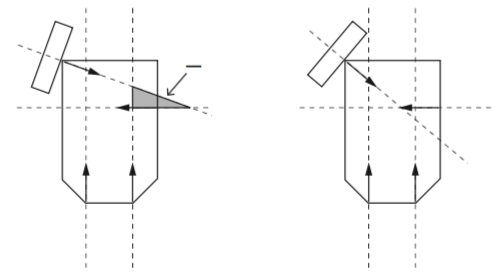Difference between revisions of "Evaluating Form Closure Project"
From Mech
Jump to navigationJump to search| Line 3: | Line 3: | ||
=== Program Specification === |
=== Program Specification === |
||
[[image:form-closure.png|left|Left: A six-sided polygon with four stationary contacts acting on it, indicated by the contact normals drawn as arrows. The region labeled <math>-</math> represents the feasible twist cone, i.e., the twists the polygon can follow without violating the contact. Right: The same six-sided polygon, but with the direction of the top left contact normal changed. Now there are no feasible twists for the polygon, so it is in form closure.]] |
[[image:form-closure.png|frame|left|Left: A six-sided polygon with four stationary contacts acting on it, indicated by the contact normals drawn as arrows. The region labeled <math>-</math> represents the feasible twist cone, i.e., the twists the polygon can follow without violating the contact. Right: The same six-sided polygon, but with the direction of the top left contact normal changed. Now there are no feasible twists for the polygon, so it is in form closure.]] |
||
here are some words about it |
here are some words about it |
||
Revision as of 11:20, 1 May 2018
This page describes the "Evaluating Form Closure" Project from the Coursera course "Modern Robotics, Course 5: Robot Manipulation and Wheeled Mobile Robots."
Program Specification

Left: A six-sided polygon with four stationary contacts acting on it, indicated by the contact normals drawn as arrows. The region labeled represents the feasible twist cone, i.e., the twists the polygon can follow without violating the contact. Right: The same six-sided polygon, but with the direction of the top left contact normal changed. Now there are no feasible twists for the polygon, so it is in form closure.
here are some words about it
